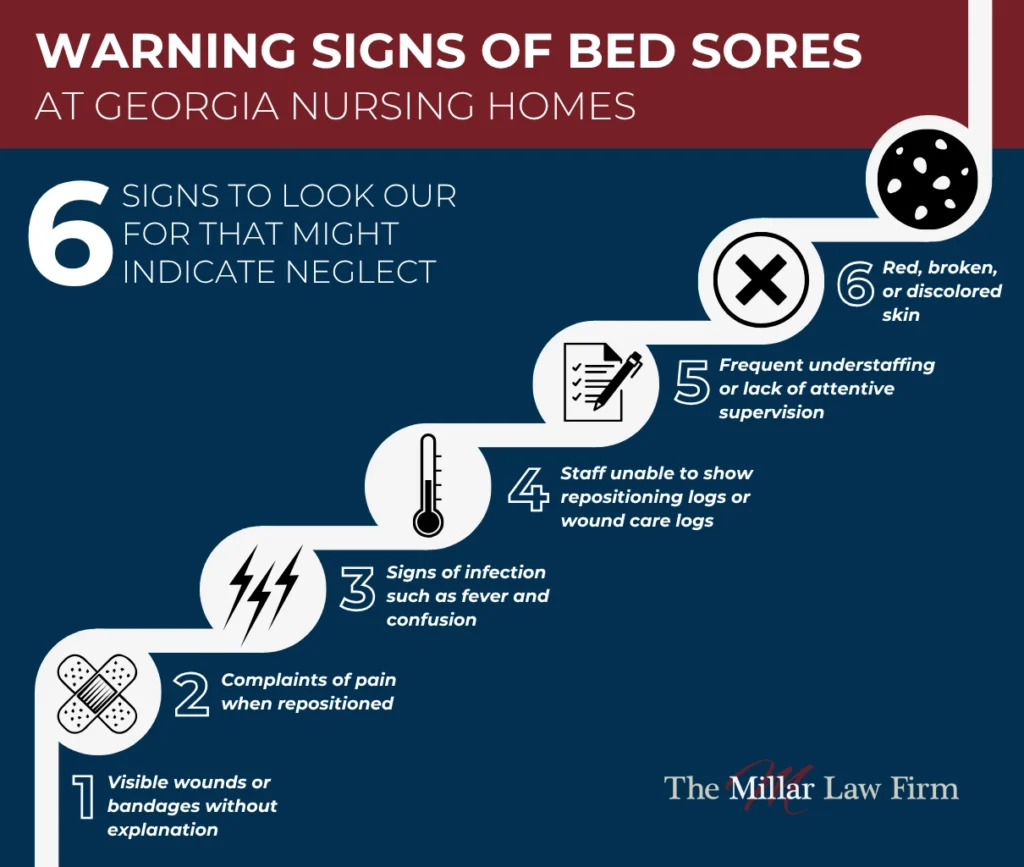Georgia Legal Guide: Nursing Home Abuse Legal Claims for Bed Sores
Key Points:
- Georgia laws require nursing homes to provide proper care, and facilities can be held legally accountable when residents suffer preventable harm. O.C.G.A. § 31-8-50 and state regulations (e.g., Rule 111-8-50) are just a few of the laws that apply.
- Bedsores are usually preventable and often signal neglect when a Georgia nursing home fails to provide adequate repositioning, monitoring, or nutrition.
- Untreated bedsores can lead to life-threatening conditions such as infections, sepsis, and even premature death.
- Families should document evidence, report concerns to state regulators, and seek legal guidance to protect their loved ones and hold negligent facilities responsible.
Table of Contents
Discovering a bedsore on a parent or loved one in a nursing home in Georgia is an upsetting occurrence. You’ve placed great trust in long-term care facilities to provide comfort, dignity, and attentive medical oversight to a family member, and when wounds such as bedsores appear, that trust is shaken.
Bedsores, also known as pressure ulcers, don’t usually develop in residents who receive attentive care. They are often an indication that a patient or resident has not been properly repositioned, monitored, or treated. Left untreated, these wounds can quickly escalate into serious medical complications and may reflect a breach of the nursing home’s duty of care.
What Bedsores Reveal About Quality of Care in Georgia Nursing Homes
Bedsores are injuries caused by constant pressure on the skin. When someone remains in the same position too long, particularly in areas like heels, hips, or back, blood flow is restricted, and tissue begins to break down. Your parent or loved one may be more at risk if they:
- Are confined to a bed or wheelchair for long periods of time
- Have chronic illnesses that limit mobility
- Struggle with malnutrition, dehydration, or poor circulation
Bedsores are highly preventable. Regular repositioning, attentive monitoring, and proper nutrition dramatically reduce the risk. When they do appear, it is often a sign that the facility has failed in its basic duties and neglect is taking place.
The Hidden Dangers of Untreated Bedsores
For elderly residents, untreated bedsores can cause far more than localized pain or discomfort. Left unchecked, they can turn into serious or even life-threatening medical conditions:
- Infections that spread into muscle or bone
- Sepsis, a life-threatening bloodstream infection
- Prolonged recovery requiring hospitalization or surgery
- In extreme cases, premature death
It’s critical to know that bedsores are an avoidable medical crisis that often reflects failures in a facility’s staffing, training, and commitment to resident safety.
How Bedsores Progress
Bedsores develop in stages, ranging from mild skin irritation to life-threatening injuries:
- Stage 1: You might notice red, warm, or tender skin over bony areas.
- Stage 2: This stage progresses to open sores, blisters, or shallow wounds.
- Stage 3: Deeper wounds appear, exposing tissue or fat.
- Stage 4: This stage is highly dangerous, in which severe injuries extend into muscle, bone, or joints of your loved one.
Early detection and treatment are critical. While Stage 1 sores can often heal with proper care, advanced sores can result in permanent damage or fatal complications.
Warning Signs Families Should Watch For in Georgia Nursing Homes
During visits, pay attention not only to your loved one’s condition, but also to their surroundings and the facility’s practices. Warning signs include:
- Red, discolored, or broken skin over pressure points
- Visible wounds or bandages with little explanation
- Complaints of pain when being repositioned
- Signs of infection such as fever or confusion
- Staff unable to show repositioning schedules or wound care logs
- Frequent understaffing or lack of attentive supervision
These signs should never be dismissed as just a part of the normal aging process. Bedsores often reflect systemic issues in care. These incidents can be more common than you’d think, as Georgia ranks 4th-lowest nationally in nurse and aide staffing levels, and over 31% of Georgia nursing homes have just 1-star federal ratings. If you’ve noticed any of these warning signs, it’s important to know that Georgia law sets clear standards for nursing home care, and facilities can be held accountable when they fall short.
Georgia Law and Nursing Home Duties
In Georgia, nursing homes are legally required under O.C.G.A. § 31-8-50 and related regulations to provide residents with adequate and reasonable care. This includes proper nutrition, safe living conditions, regular monitoring, and the repositioning of immobile residents to prevent bedsores.
When facilities fail in these duties and residents suffer preventable harm, it may constitute neglect. In such cases, the nursing home can be held legally accountable for the injuries, medical costs, and suffering caused. Families have the right to demand answers, and the law is on their side.
What to Do if You Suspect Neglect at a Georgia Nursing Home

If you believe your loved one’s bedsores may be the result of nursing home neglect, it is important to act quickly. Taking the following steps can help you document what has happened, hold the facility accountable, and ensure your loved one receives the care they deserve.
- Document evidence such as pictures of the wounds, and keep copies of communications with staff.
- Request answers and ask the facility directly for wound care records and care plans.
- Report concerns with Georgia Long-Term Care Ombudsman: 1-866-552-4464 or georgiaombudsman.org or the Healthcare Facility Regulation Division: (800) 878-6442
- Consider relocation if your loved one is unsafe, and have them transferred to another facility
- Seek legal guidance: A personal injury attorney, like those at The Millar Law Firm, can help determine if your loved one’s injuries stem from neglect and determine what legal paths may be available.
Nursing Home Neglect Can Take an Emotional Toll on Families
For most adult children, discovering bedsores triggers guilt, anger, and helplessness. It's understandable to question your own choices: "Did I fail my parents by choosing this facility?"
It is important to remember that such accidents are not your family's fault. Nursing homes are responsible for the duty of care. It’s important to keep this in mind, and allow yourself to focus on what matters most: keeping your loved one safe and securing the care that they deserve.
How The Millar Law Firm Can Help
Our law firm has over 32 years of experience getting nursing homes to compensate for preventable injuries. We gather the right evidence, such as the medical records, treatment charts, and staff reports, and consult with physicians to establish the level of care.
By establishing when and how a facility neglected its duties, we recover for medical expenses, pain and suffering, and other damages. We offer free, no-fee consultations, and you will never owe your personal injury attorney costs unless we settle or win your case.

 1201 West Peachtree Street #2339 Atlanta, GA 30309+1-770-212-3795$0-$100000
1201 West Peachtree Street #2339 Atlanta, GA 30309+1-770-212-3795$0-$100000I was very pleased with the service I received from the law firm. The lady who handled my case was wonderful, and my settlement was more than I expected.

You should request all available documents, and escalate your complaint to Georgia’s Long-Term Care Ombudsman or state regulators, as well as contact a personal injury lawyer.
Yes, families may pursue a personal injury or wrongful death claim if preventable bedsores result from neglect.
We work on a contingency basis, so you pay no fees to The Millar Law Firm unless compensation is recovered by your personal injury lawyer.
You should look for such things as unexplained weight loss, neglect of personal hygiene, sudden changes in behavior, or frequent infections; all of which may indicate sub-standard care.















